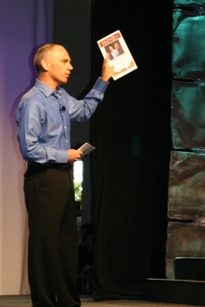Demo: 'More product designed from the user in'

Chris Shipley, host of DEMO, takes the stage to promise some fun and controversial technology demonstrations. She starts with a discussion about what's going on in the market, whether there is a bubble going on. Noting that there is only a third of the venture capital work today as in the late 90s.
"Clearly, we are in the early days of an important new growth cycle" built on the foundation of things introduced a decade ago--half of the products at this DEMO use Java, for example. Most of the products that will be shown over the next couple days are connected products or services. The network is pervasive today, where it was only a promise of pervasiveness before. "More product is being designed from the user in rather than the engineer out...."
The products we'll see here are another layer in the foundation. In the aggregate, these products draw a picture of the market we'll live in. The first set are simplifying products, adding ease of use and access to information to users. We're starting with in-car navigation, but a fully realized user environment for accessing information in the car. Each device, made by Dash Navigation, is a node in a social network.
Paul Lego and Robery Currie of Dash show Dash, which will ship in January, in a mock-up of a car sitting in the front of the room. There is a UI on the Web that a friend can use to send information, like an address to Dash in the car. This data can be used to calculate multiple routes based on live traffic data, including Dash devices collecting data on the roads. Once selected, the route is spoken in a female Stephen Hawking-like voice.
They show typing in a request for finding wine on the way to dinner, finding movies and gas prices on a virtual keypad on the screen. Seems like a lot of looking away from the road, and in the demo we saw the person sending their address was key to orienting the device. Connected, interesting, but I'd want my wife to run the computer while I drove.
Next up, Tribeca Labs. A photo enhancement system, digital editing without editing. A "zero-click" photo correction system called PhotoBot. "He," Mike Bevans says, referring to the application, "works in the background to improve my photos." The system is a set of algorithms that correct images. "For about $30 PhotoBot will improve all your pictures."
PhotoBoto also has a photo bank, a storage system in Switzerland--I guess the pictures will be hidden with all that Nazi gold--so that pictures "never disappear." My grandchildren may resent the monthly charge to keep the photos alive, but, hey, they will have pictures of their parents and grandparents in Switzerland. "Swiss PictureBank" will be kept safe from obsolesence and deletion."
Next, the "paradox of podcasting" will be addressed by Pluggd, a word and phrase level search of audio. They show a player that launches an ESPN podcast--there's an ad, some baseball reports, but the demonstrator is looking for Tiger Woods data. So the player is able to search for the acronym "PGA," and the location of the phrase is displayed in the playbar as a "hot zone" that can be used to fast-forward to the part of the show.
They say they are using speech recognition and topic identification technology to do this. Hard stuff. I'd like to have seen the tech demonstrated against something that happened today, rather than a file from a month ago.

Presto converts emails using templates, so your pictures can come with holiday flavor or delivered as a photo calendar. They also have a "newstand" service that delivers media to the device, printing it out to the device. So, "Mom can get her sodoku fix each morning." The device is $149, plus $9.99 a month for the service, including all the media content. Launches next month for the holiday season.
MojoPac, from RingCube Inc., is a USB or iPod-based system transport that lets you plug a mobile storage device into any PC and turn it into your PC. The system carries all applications and the OS. When plugged in, the PC reboots on the device. In this case, the iPod is carrying the whole PC environment. Basically, a mirror of the PC storage. Very cool. Wonder how much storage I give up on my iPod? The two OS environments also run concurrently, so you can switch from one PC workspace to the other. Leaves no footprint on the host PC, "What happens in MojoPac stays in MojoPac." Product available today at Mojopac.com.